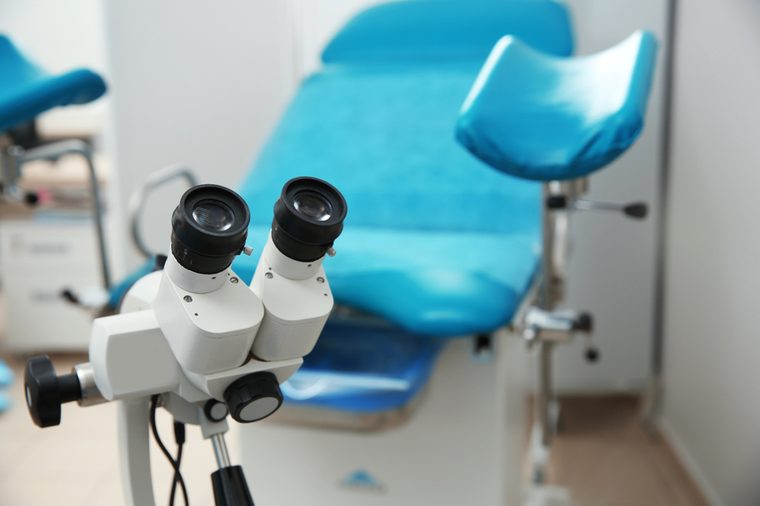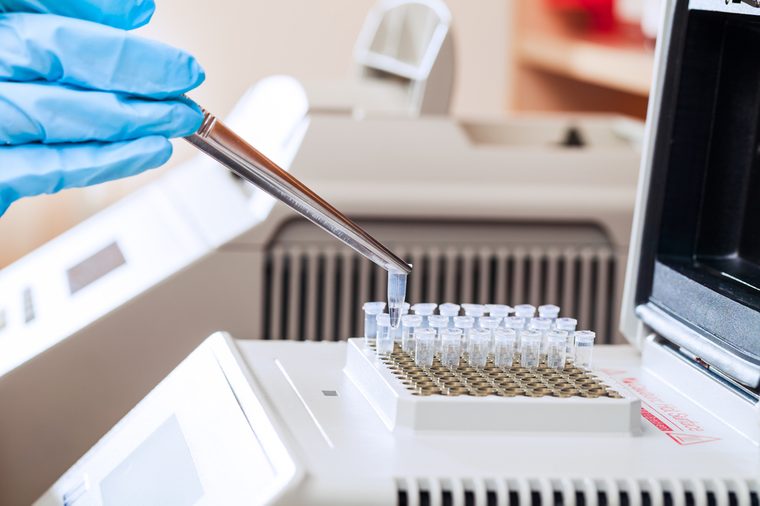Do you know what uterine cancer is?
While the term uterine cancer may not be as frequently talked about, you’ve no doubt heard of endometrial cancer, the more common type of this female cancer. This is when cancer forms in the tissues of the lining of the uterus (endometrium).
Uterine cancer is the most common cancer of the female reproductive system. According to the Canadian Cancer Society, an estimated 7,300 Canadian women were diagnosed with uterine cancer in 2017. As mentioned, the majority of uterine cancers (more than 95 percent) are endometrial cancer. The second type—uterine sarcoma, a cancer that forms in the muscles of the uterus—is rare. About 2-5 percent of all uterine cancers are uterine sarcoma, reports the Canadian Cancer Society.

There’s one big early symptom to watch for
Endometrial cancer most often strikes women who are over age 55. That makes one of the few uterine cancer symptoms particularly eye-catching: “Postmenopausal bleeding is the heralding symptom. It is distinctly abnormal,” says David Mutch, MD, a gynecologic oncology surgeon at Siteman Cancer Center and chief of the Division of Gynecologic Oncology at Washington University School of Medicine in St. Louis. This bleeding may begin as a watery, blood-streaked flow and gradually contain more blood as bleeding goes on. Be sure to tell your doctor about excessive bleeding. You’ll also want to disclose these 8 other secrets to your gynecologist.

And only one possible action to take
If you’re postmenopausal and are now bleeding vaginally, your priority is to go to the doctor immediately, Dr. Mutch advises. The point here isn’t to cause you to freak out but to understand the seriousness of uterine cancer symptoms. It doesn’t mean that you have cancer—only that any bleeding after menopause is abnormal and should be checked out. Your doctor may want to do a transvaginal ultrasound to measure your uterine lining and take a biopsy if necessary. Don’t miss these 15 cancer symptoms women are more likely to ignore.

What if you’re premenopausal?
While it may be alarming when you’re bleeding after you’ve already gone through menopause, getting your period when you’re premenopausal is to be expected. So how do you know when something’s going on? In younger women, abnormal bleeding is still the most common symptom of uterine cancer, according to the Canadian Cancer Society. Pay attention if your periods are irregular, you’re spotting, or you’re bleeding between periods. And don’t miss these signs of early perimenopause.
Other uterine cancer symptoms may be harder to spot
Uterine cancer symptoms (in the endometrium) include more than just bleeding: Abdominal or pelvic pain, bloating, feeling full quickly, and changes in bowel or bladder habits are others, according to ACOG. However, these usually occur during later stages—and they can be caused by many other conditions. “Endometrial cancers are typically small. They won’t usually cause pain unless advanced,” says Dr. Mutch. Still, these can be symptoms of other medical problems as well, from fibroids to cervical or ovarian cancers, so they warrant a trip to the doctor for an evaluation. Be aware of this common–but often missed– sign of ovarian cancer.

What is the treatment?
The good news about endometrial cancer is that the telltale symptom (abnormal bleeding) typically happens in the initial development of the disease, so it’s most often caught in early stages. Treatment is a hysterectomy (removal of the uterus) and may also involve radiation; it’s usually successful. “Most people don’t die of this cancer. When caught early in stages 1 and 2, there’s a great prognosis. Most of these cancers are easily curable,” says Dr. Mutch, who notes that the cure rate is 90 percent. (Read this woman’s story of battling cancer at the age of 17.)

How to prevent uterine cancer
Here’s something you might not expect: Cardiovascular disease is more likely to kill women with endometrial cancer than the cancer itself, according to the NCI. Aside from the fact that endometrial cancer is most often caught early, “obesity may actually be the underlying disease,” says Dr. Mutch. Indeed, rising levels of obesity may be behind the increase in cases of this cancer. Excess fat can lead to excess estrogen, which can thicken the lining and cause irregular bleeding. “Women who are at a normal weight typically don’t get this cancer,” he says. The best thing you can do to protect yourself is to maintain a healthy weight.
Related: Plus-size model Elly Mayday on being diagnosed with ovarian cancer at 25.

What about uterine sarcoma?
This cancer may make up just 2-5 percent of uterine cancers, according to the Canadian Cancer Society. Unfortunately, they’re quick to spread and are often advanced before a woman knows something is wrong. Nonetheless, look for abnormal bleeding. Ten percent of women with the condition will experience abnormal discharge. The message here is that you shouldn’t brush off any symptom that doesn’t feel right.

Get genetic testing
If you are diagnosed with uterine cancer, your doctor should talk to you about genetic testing. Dr. Mutch points out that 5 to 10 percent of women who are diagnosed have a hereditary form of the disease. (One form is Lynch syndrome, which increases the risk of other cancers, like colon cancer.) “All patients with endometrial cancer are tested for this and should be. Ask your doctor if your cancer is hereditary,” says Dr. Mutch. Here’s where knowledge is power: You will also be screened for colon cancer, and you can sound the alarm for family members.
Next, find out the Canadian provinces with the highest rate of cancer.


